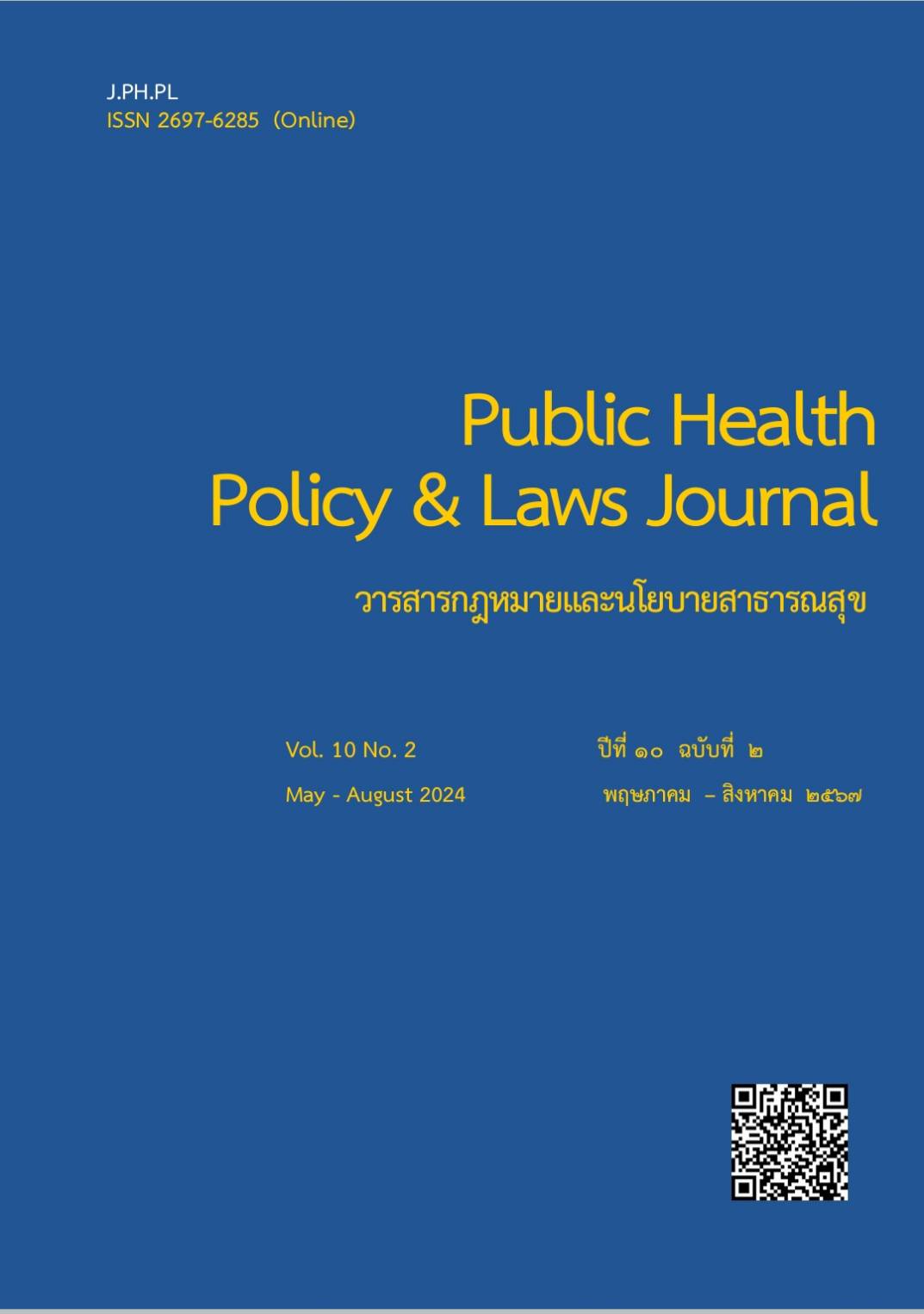The presumption of facts in medical negligence cases: a perspective from patient (plaintiff) protection and the defense of the physician (defendant)
Keywords:
presumption of facts, medical negligence, protection of patientsAbstract
This article aims to help medical personnel including those who are interested in legal matters, to understand the principle of presumption based on facts, which is an important evidentiary principle for judge’s considerations in tort cases. The principle of presumption of fact has long been an important legal principle in Thai court for decision-making in tort cases of negligence, including tort cases of medical negligence. As a means of maintaining justice - to provide victims with compensation in situations where it is obvious that they will not receive compensation due to the difficulty of the burden of proof. The principle of presumption of fact results in the plaintiff’s benefiting from an inference or preliminary assumption of the defendant's negligence. It is not to prove absolute negligence. A defendant can still rebut the presumption of presumed negligence by disproving that they did not act negligently - by showing evidence that he or she has performed treatment according to a good medical knowledge and standards. Therefore, it gives the defendant an opportunity to fully fight the case without being bound by the plaintiff's complaint. This article demonstrates the importance of using factual presumptions in medical malpractice cases based on negligence as a legal evidence that judges employ to ensure fairness to both plaintiffs (patients) and defendants (doctors and other personnel).
References
Chanatorn, Jittidecho. (2008). Burden of proof in the case of presumption of based on facts.
Dhunlapaha, Journal of the Court of Justice. Vol. 2 Year 55.
Chutiwongse, Khemchai. (2022). The explanation of the law of evidence. (11th ed.). The Thai Bar. Bangkok.
Kacharoen Suthep. (2563). Problems of proving negligence of medical personnel: a cases study of
offenses in community hospitals, B.E. 2020. Retrieved on 22 December 2023 from
https://library.coj.go.th/en/media/56256/media-56256.html.
Khan AN. (1988). Medical negligence: Res Ipsa Loquitur. Medico-legal J. 1985:53 (Pt 3):164-8. doi:
1177/002581728505300306.
Kittisak Anekteerakul. (2019). Use of Presumption in Judicial Decisions. Retrieved on 22 December 2023
from https://library.coj.go.th/th/media/53861/media-53861.html.
Kraivichien Kanyarat. (2016). Elements of Medical Malpractices. Public Health & Health Laws Journal. 3
(2). (May-August 2016).
Louisell and Williams. (1960). Res Ipsa Loquitur-It's Future in Medical Malpractice Cases. Calif. L. Rev.
Vol. 48, No. 2 (May, 1960), pp. 252-270. Retrieved from https://www.jstor.org/stable/3478530.
Matthew R. Johnson. (1997). Rolling the "Barrel" a Little Further: Allowing Res Ipsa Loquitur to Assist in
Proving Strict Liability in Tort Manufacturing Defects. William & Mary Law Review. Volume 38
(1996-1997). Retrieved on 15 January 2024 from
https://scholarship.law.wm.edu/wmlr/vol38/iss3/10.
Pakdeethanakul, Jarun. (2566). Law of Evidence. (17th ed.) Bangkok. Winyuchon.
Patrick van den Heever. (2002). The Application of the Doctrine of Res Ipsa Loquitur to Medical
negligence cases: A comparative survey. the University of Pretoria. submitted by the requirements for the degree of Doctor Legum. Retrieved on 20 December 2023 from chrome- extension://efaidnbmnnnibpcajpcglclefindmkaj/https://repository.up.ac.za/bitstream/handle/2263/27065/Complete.pdf?sequence=12&isAllowed=y.
Peter D. Byrnes. (1962). Negligence-Res lpsa Loquitur-Application to Medical Malpractice: 1951-196
Actions: 60 MICH. L. REV. 1153 (1962). Retrieved on 21 December 2023 from
https://repository.law.umich.edu/mlr/vol60/iss8/6.
Patanavanich, Roengrudee. (2017). Fundamental Elements of Medical Malpractice. Public Health Policy
and Laws Journal, 3(2), 211–227. Retrieved on 15 January 2024 from https://so05.tci-
thaijo.org/index.php/journal_law/article/view/161658.
Prosser William L. (1949). Res Ipsa Loquitur in California. California Law Review. Vol. 37, No. 2 (Jun.,
.
Pusapakhom, Poj. (1987). Tort. Bangkok: Legal Training Center of the Thai Bar Association.
Ratanakorn, Sophon. (2010). The Explanation of Law of Evidence. (10th ed.). Nittibanakarn. Bangkok.
Shenoy, G.N. Shenoy, G.G. “Shenoy. (2002). Res Ipsa Loquitur: An insight into the novel Seven ‘I's of
Indicative Treatment - A potential defense for the defendant doctor. Ethics, Medicine and Public
Health. Volume 21, 2022, 100751. Retrieved from
https://www.sciencedirect.com/science/article/abs/pii/S2352552521001286.
Society and Health Institute, (2006). Medical Spirit. Retrieved on 22 December 2023 from
http://www.shi.or.th/content/36/.
Tyler Goldberg-Hoss. (1995). Res Ipsa Loquitur in Medical Negligence Cases. CMG Law. January 1, 1995.
Retrieved 11 February 1024 from https://cmglaw.com/articles/res-ipsa-loquitur-in-medical-negligence-cases/.
Wukir Prayitno. (2020) Advances i Application of Res Ipsa Loquitur to the Medical Negligence Case in
Patient Protection Perspective. Economics, Business and Management Research. volume 140.
International Conference on Law, Economics and Health (ICLEH 2020).
Downloads
Published
How to Cite
Issue
Section
License
Disclaimer and Copyright Notice
The content and information presented in articles published in the Journal of Law and Public Health Policy represent the opinions and sole responsibility of the respective authors. The editorial board does not necessarily agree with or assume any responsibility for the views expressed.
All articles, data, content, images, and other materials published in the Journal of Law and Public Health Policy are the intellectual property of the journal. Any individual or organization wishing to reproduce, distribute, or otherwise use the entirety or any part of such materials must provide proper citation.





